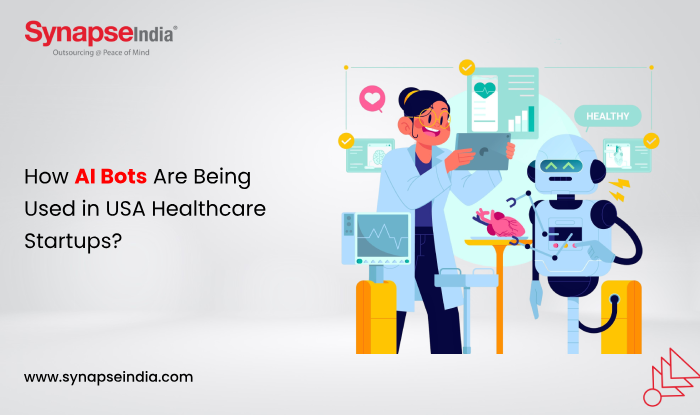 18 Sep 2025
18 Sep 2025
AI bots are transforming healthcare startups in the USA by handling patient queries, aiding diagnostics, and streamlining admin work to make care faster and more personal.
Globally, by 2030, the AI in healthcare market could hit USD 110.61 billion (Research and Markets, 2025). That's a big jump from today, showing how fast things are moving.
AI bots in healthcare are popping up everywhere in startups across the USA. These tools chat with patients, sort symptoms, and even help doctors make quicker calls.
In the first wave, many startups focus on basic tasks. But now, they're getting smarter, using data to predict needs and cut wait times.

AI bots are software that talks like a person. They use machine learning to understand questions and give answers.
In healthcare startups in the USA, these bots often start as chat features on apps or websites. They handle simple stuff, like booking visits or reminding about pills. Over time, they learn from interactions. This makes them better at spotting patterns in health data.
The global healthcare chatbots market will hit $4,355.6 million by 2030, growing 24% each year from 2025 (Grand View Research).
Patients today want quick answers without long waits. AI bots in healthcare make this possible by offering instant replies around the clock.
For example, a bot can ask about symptoms and guide patients on next steps. This reduces stress and helps people reach care faster.
Startups also use AI chatbots for mental health support. A quick chat can check mood, provide resources, or connect users to professionals if needed.
These interactions feel more personal, as if talking to someone who remembers past concerns and understands the patient’s history.
AI bots help reduce the load of paperwork in medical settings. They can fill out forms, update patient records, and even process billing codes. This allows staff to focus more on direct care.
For startups, the benefit is clear, less overhead and faster operations. 85% of healthcare leaders are exploring or using gen AI, per a Q4 2024 survey (McKinsey, 2025).
Beyond admin tasks, bots analyze health data to spot trends. They can flag early warning signs of risks, such as potential outbreaks or sudden drops in patient engagement.
Startups are building bots that help predict and prevent health issues. By analyzing past data, these bots can warn patients about possible risks.
Remote monitoring is another area where AI bots make a difference. Through wearable devices, they track vitals and send alerts if something looks off.
This helps keep patients healthier at home, reduces hospital visits, and lowers costs while improving quality of life.
While AI bots bring many benefits, startups face challenges too.
Here are some real-world uses of AI bots in USA healthcare startups:
These examples show how bots make care more accessible and help startups stand out in a competitive space.
SynapseIndia has years of experience building AI bots for healthcare startups in the USA. We design tools that are safe, easy to use, and built with real-world needs in mind.
Our team combines technical expertise with a deep understanding of healthcare operations. The result is bots that help patients, reduce workload for staff, and support business growth.
Clients who work with us see tangible outcomes, smoother processes, happier patients, and measurable improvements in care delivery.

AI bots are changing how healthcare startups in the USA operate. From patient chats to ops help, they're making things better.
Looking ahead, these tools will only get smarter. Startups that jump in now will lead.
Ready to bring AI bots into your healthcare startup? Connect with SynapseIndia today for custom solutions that drive results.
Costs vary based on features, but basic ones start around $10,000, scaling up for advanced options.
It usually takes 3-6 months, depending on complexity and testing needs.
Yes, with proper encryption and rules like HIPAA, they keep info safe.
No, they support doctors by handling routine tasks, not making final calls.
Common ones include Python for learning, plus cloud services for scaling.
.jpg)
 07 Mar 2025
07 Mar 2025
